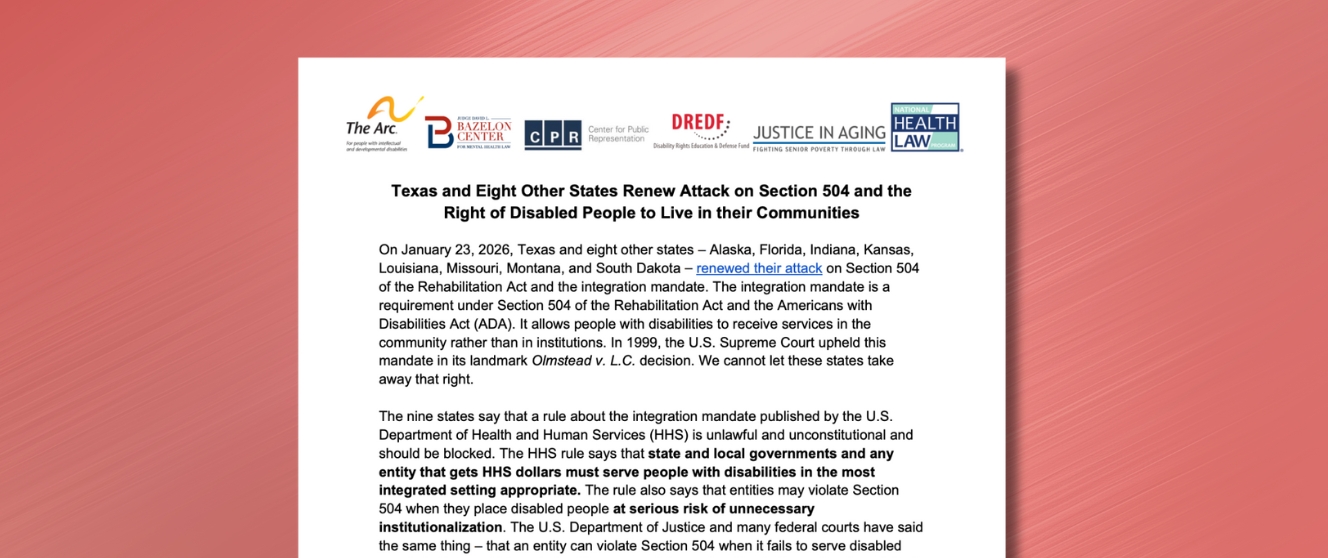
January 31, 2020
The Honorable Andrew Saul
Commissioner of Social Security
6401 Security Boulevard
Baltimore, MD 21235-6401
Submitted via www.regulations.gov
Re: Notice of Proposed Rulemaking on Rules Regarding the Frequency and Notice of Continuing Disability Reviews, 84 Fed. Reg. 36588 (November 18, 2019), Docket No. SSA-2018-0026, RIN 0960-AI27
Dear Commissioner Saul:
The Disability Rights Education and Defense Fund (DREDF) submits the following comments in response to the Notice of Proposed Rulemaking on Rules Regarding the Frequency and Notice of Continuing Disability Reviews. DREDF is a leading national civil rights law and policy center directed by individuals with disabilities and parents who have children with disabilities. Our mission is to advance the civil and human rights of people with disabilities through legal advocacy, training, education, public policy and legislative development.
While the Social Security Administration (SSA) is required by Congress to perform periodic Continuing Disability Reviews (CDR) on recipients of Supplemental Security Income (SSI) or Title II Social Security benefits awarded on the basis of disability, we have significant concerns about SSA’s proposal to perform more CDRs, more frequently, and to create a new category of “Medical Improvement Likely.” The CDR process is burdensome and stressful for people with disabilities, their families, and the service providers who assist them. Performing CDRs more frequently will increase that burden, and place at greater risk millions of adults and children with disabilities. DREDF urges SSA to withdraw this rule immediately.
CDRs are already a significant burden on beneficiaries
Everyone who receives a CDR has been found disabled by SSA, meaning they have at least one severe and medically determinable impairment that will last at least one year or be fatal. Some of these disabilities, including intellectual disabilities and mental health disabilities, directly impact an individual’s ability to respond to forms and will require additional assistance from service providers, family members to complete, or from SSA personnel as a reasonable accommodation under Section 504. In addition, disability beneficiaries are often older and have lower income, less stable housing situations, and less education than the general population, providing additional challenges when they need to fill out CDR paperwork and submit supporting documents like medical records. For children undergoing CDRs, the burden on families and service providers is substantial—adults must take time off of work and children must take time out of school for medical appointments in response to the form.
The full medical CDR form is burdensome in and of itself. It is 15 pages long and requires multiple stamps to be mailed back to SSA. It requires beneficiaries to write short essays, report all the medication they take and all of the medical treatments and providers they attend, and all of their daily activities. For adults and children with disabilities, this is usually a huge amount of information. It asks for detailed summaries of the medical treatment received over the past 12 months, information that the individual is unlikely to know in the detail required, thus necessitating assistance from health care professionals or other service providers. While it would be challenging and time-consuming for anyone to fill out, many of those who will need to fill it out have disabilities that will add additional complexity. For example, a SSA beneficiary who is blind will need the form to be fully screen-reader accessible and potentially submittable online so it can be filled out independently. If individuals do not successfully and timely return the form, they will easily become part of an increasing number and percentage of CDR recipients whose disability benefits are terminated for “failure to cooperate” with the CDR process rather than any actual change in their medical condition or eligibility. Adequate income support must be given to individuals and their families whose lives depend on SSI and SSDI.
CDRs are costly for beneficiaries
CDRs are also costly to beneficiaries, who often need to pay for medical records or appointments with their doctors and other providers to fill out forms. Although some states require medical records be provided free to Social Security disability claimants, this does not extend to beneficiaries undergoing CDRs. Beneficiaries may need to hire representatives to assist them in completing CDR paperwork or proceeding through multiple levels of appeals.
CDRs are vital: tied to access to healthcare, housing and food
Not completing CDR paperwork or doing so incorrectly can jeopardize benefits that are a matter of life and death to people with disabilities—not only Social Security benefits, but also other critical benefits such as Medicare, Medicaid, housing assistance, and food assistance that are tied to SSA’s finding of disability.
SSA should not force beneficiaries to experience the burden of a CDR more frequently or place beneficiaries more at risk of incorrectly losing their benefits without evidence that doing so will improve program integrity and outcomes for beneficiaries and conform to the Social Security Act.
The CDR system is inefficient and under-resourced
The draw of needed resources from more important areas in order to focus on this unnecessary initiative is concerning. Adults and families of children with disabilities with limited resources already experience lack of service at local offices, leading to inefficiency, delay, improper outcomes, and genuine anxiety. Individuals have difficulty reaching a SSA worker on the phone, or being seen at a field office. Beneficiaries who are told to respond in writing within ten days to have their benefits continue pending an appeal may receive the notice after the ten days have already run, they may not receive the form in a needed accessible format or language, they may be given the wrong forms to submit when they inquire, and they may be given an appointment at a field office and then refused service when they arrive at the appointed place and time.
SSA should focus its efforts on fixing well-known and longstanding problems instead of increasing the workload on SSA staff and placing additional significant burden on individuals and children with disabilities. In addition, the proposed rule would slow down the benefits system for everyone. The proposed rule makes an estimated time burden of only 160,000 hours which does not appear to take into account due process considerations that will arise if a beneficiary wishes to appeal their categorization into the new “Medical Improvement Likely” category or disagrees with implications that follow a given CDR review.
Conclusion
SSA should not force beneficiaries to undergo the significant burden of the CDR process more frequently, especially without evidence that doing so will improve program integrity and outcomes for beneficiaries and conform to the Social Security Act. DREDF urges SSA to withdraw this harmful and overly-burdensome rule.
Please do not hesitate to contact Staff Attorney Sydney Pickern at spickern@dredf.org with any questions.
Sincerely yours,
Susan Henderson
Executive Director

